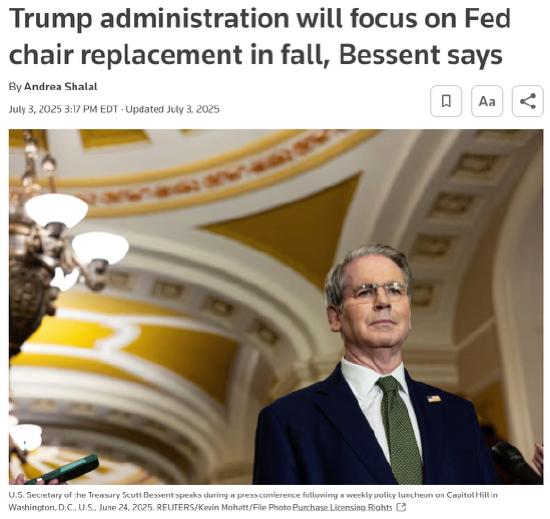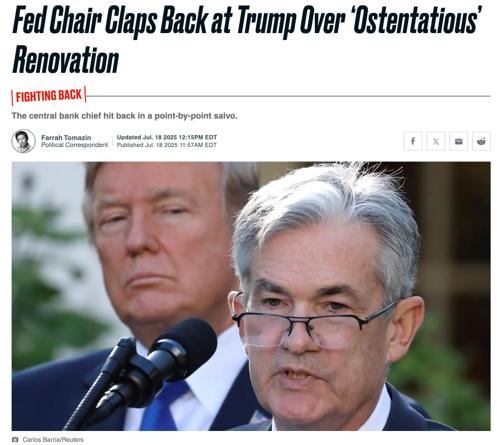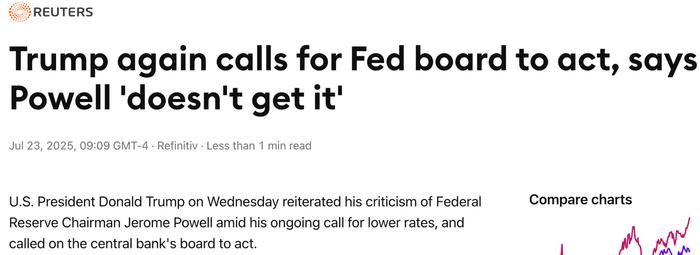


On July 23rd, local time, President Donald Trump took to his social media platform to once again fiercely criticize Federal Reserve Chairman Jerome Powell, accusing him of refusing to cut interest rates in a timely manner, leading to a lag in the housing market and harming American families and the national budget. This statement immediately raised concerns about the president’s interference with the independence of the Federal Reserve.
According to Reuters, President Trump once again criticized Powell. This marks the third time this month that Trump has publicly targeted Powell. Since early July, Trump has frequently criticized interest rate policies in various public speeches, interviews, and on social media platforms, although most have not specifically mentioned Powell himself, there is clear dissatisfaction with the Fed’s monetary policy.
In light of recent budget reviews initiated by the White House around the renovation of the Fed building, the American public generally believes that the conflict between Trump and Powell has entered a new tense phase, with the independence of the Fed facing unprecedented political challenges.
Why has Trump escalated his offensive?
According to The Guardian, Trump criticized Powell as “a fool” and described his appointment as “one of my worst decisions.” Since early July, Trump has repeatedly attacked Powell over interest rate policies, accusing him of refusing to cooperate with the White House’s unified path for rate cuts, which resulted in soaring costs for the real estate market, severely suppressing the purchasing power for middle-class families. Especially at a closed fundraising event on July 22nd, Trump used the term “numbskull” (fool) in a rare description of Powell and openly stated, “He should leave in eight months.”
Combining Trump’s recent statements such as “interest rates should be cut by 300 basis points more” and “the Fed Board lacks courage,” it is widely believed that Trump is deliberately using continuous public opinion bombardment to pave the way for the next round of personnel changes and institutional reforms.
Furthermore, Trump’s actions are not only a policy disagreement but also an effort to reinforce the narrative that “Powell is the person responsible for economic issues,” thereby continuously building public distrust towards Powell and attributing current economic challenges to the Federal Reserve, thus seeking political advantages.
Currently, the White House has initiated an investigation into the “excessive renovation costs” at the Federal Reserve headquarters, led by the Presidential Management and Budget Office for audit evaluation. The President’s economic team believes that this originally planned project, costing $1.9 billion but now ballooning to about $2.5 billion in total, lacks transparency, questioning its budget management level and hinting at holding Powell accountable for it.
△According to The Daily Beast, Powell has repeatedly dismissed the accusations against the Fed building renovation by the White House.
In response, Powell, in a rare statement, said that most of the project approvals were made before his tenure, and the current attack is purely politically motivated.
In fact, this is not the first time Trump has publicly confronted Powell. During his first term, he repeatedly criticized Powell over interest rate hike policies, even considering removal, but ultimately did not take any substantive action.
However, compared to the previous confrontation, this round is more systematic and organized.
If Trump’s first term was a “Twitter storm” attack on Powell, this time it is an “agenda-driven” pressure, showcasing clear strategic coordination from social media to closed-door speeches, from interest rate disputes to renovation audits, presenting a more intense and forceful tone.
At the same time, the target of this round of confrontation is more specific. Powell’s tenure will end in May 2026, and the Trump camp clearly sees him as a “barrier in the countdown,” releasing a “change of personnel” signal ahead of time.
Regarding the choice of successor for Powell, candidates such as Kevin Warsh, Director of the National Economic Council at the White House, Kevin Harsnett, Treasury Secretary, and Federal Reserve Board member Christopher Waller are all under consideration by Trump.
Lastly, the institutional contestation in this round of conflict is also more intense. Unlike Trump’s previous term, which mainly targeted “individual discontent”, this time Trump clearly intends to achieve deeper institutional reforms through personnel changes and budget linkage, focusing on weakening the independence of the central bank and strengthening fiscal coordination.
What will the Fed do next?
Faced with Trump’s ongoing pressure, Powell has always emphasized the “non-political” nature of the Fed. In the future, it is highly probable that he will continue to defend interest rate policies using technical language and data, avoiding direct confrontations with Trump. Several insiders close to the Fed have also stated that Powell will continue to emphasize the principle of “making decisions based on data” after the interest rate meeting at the end of July, aiming to avoid falling into political disputes.
At the same time, Powell may also seek congressional support, especially from Democrats, through regular hearings and communication with the Senate Banking Committee, seeking institutional support to exert some constraints on Trump.
However, there is a general expectation that the Fed Board will be more cautious in its policy statements in the future, internally seeking to strengthen unity to maintain systemic stability. Some members even plan to call for “defending the independence of the central bank” in their future public speeches to stabilize market confidence.
Currently, the market generally believes that there will be no interest rate hikes at the end of July nor an immediate rate cut. However, there is still high uncertainty regarding the monetary policy direction after the second half of 2025. Amidst Presidential pressure and inflationary pressures, the Fed is facing a difficult choice.
△ Reuters reported that Treasury Secretary Bessent stated that he would pay special attention to the personnel changes within the Federal Reserve.
Whether this battle will ultimately evolve into a Fed reform, Powell’s early departure, or just another round of high-intensity political probing remains uncertain. However, it is certain that this power struggle is not only about the future of U.S. monetary policy but will also profoundly affect the global capital market’s trust in the “dollar system.”